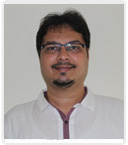- Language Marathi
- Schedule
- Reading Course
- Modi Script classes
- Activity Photos
- Housing
- Estimated Expenditure
- Online Learning
- Guideline on Pune Arrival
Marathi and its importance
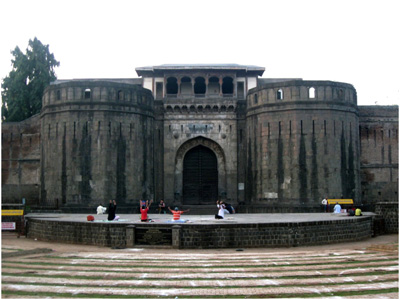
Marathi a New Indo-Aryan language is the primary language of Maharashtra, the third largest state of India. Marathi is the fourth dominant language after Hindi, Telugu and Bangla. Marathi ranks 19th in the list of most spoken languages in the world. According to the 2001 census, there are 96 million speakers of Marathi.
The Marathi language is a descendant of Maharashtri Prakrit descended from Sanskrit. It has a long and sacred tradition, though it is difficult to date the earliest scriptures. It is said that the first inscription in Marathi dated AD 983 is at Shravanbelgol in Karnataka. Mukundaraja 'Viveksindhu', Mahimbhatta's 'Leelacharitra' and Saint Dnyaneshwar's 'Bhavartha Deepika' (Dnyaneshwari) were the early texts in Marathi. Since then a gigantic flow of outstanding literature is throbbing in the hearts of people. Marathi language is enriched by the writings of profound philosophers and saint poets such as Dnyaneshwar, Naamdev, Eknath, Tukaram, Ramdas, Bahenabai, etc. social reformers and thinkers such as Mahatma Phule, Agarkar, Tilak, Ketkar, Ranade, Savarkar, Babasaheb Ambedkar etc. Marathi literature is found abundant in all forms of stories, novels, biographies, essays, dramas, history, poetry, saint literature, folk-literature, dictionaries, science, magazines, newspapers, etc. From colonial period, Marathi theatre is considered as a unique attribute of Marathi culture. Presently, Marathi is considered as the only language in which a literary event called Akhil Bharatiya Marathi Sahitya Sammelan (All-India Marathi Literature Meet) is held every year at various locations around the globe.
Location
Pune is a city located in the western Indian state of Maharashtra. With a population of 3.5 million, it is the ninth-most populous city in India and second largest city in the state of Maharashtra. It is located roughly 120 kilometers east of Mumbai at an altitude of 560 meters above sea level. It is situated at the eastern edge of the Western ghats on the Deccan plateau.
Pune was once the centre of power of the Maratha Empire established by Shivaji Maharaj. In the 18th century, Pune became the political centre of the Indian subcontinent, as the seat of Peshwas who were the prime ministers of the Maratha Empire were based here. Pune is widely considered the cultural capital of Maharashtra. Pune has a reputation for its several esteemed colleges and educational institutions-- the reason why it is called the Oxford of the East (or 'Oxford of India'). It has a very strong presence in the automobile sector and is on its way to consolidate its position as the 'Detroit of India' too. Once referred as a 'Pensioners paradise' it is now home to many software and IT companies.
The Program
The syllabus is designed according to the students' proficiency level. The medium of instruction for all classes is Marathi.
| 9-10 | 10-11 | 11.00 - 11.15 | 11.15 - 12.15 | 12.15 - 1.15 | |||
|---|---|---|---|---|---|---|---|
| Monday | Grammar Review | Literary Reading | PT | Writing - Composition | Journal Error Correction | ||
| Tuesday | Grammar Review | Oral Presentation - Narration | Tea | Listening - Audio / Film preparation | Magazine Reading | Lunch | Zero hour |
| Wednesday | PT | Newspaper Reading | Break | Film Viewing/ Vocabulary Review | Film Viewing/ Language Games | Break | |
| Thursday | Grammar Drills | Monolingual guest / Guest Lecture/ Local trip preparation | Listening - Video / Film Review | Writing - Translation/ Dictation | Local Trip | ||
| Friday | Oral Presentation - Situational Conversation | Monolingual guest / Guest Lecture | PT | Weekly Test | Student - Teacher meeting, next week preparation | Local Trip |
Advanced Reading Course in Marathi
The aim of this reading course is to help the students to read the texts in their related field of interest.
- Eligibility - minimum one year of Marathi study.
- Duration - one semester (Fall or Spring)
- A screening test will be conducted to understand students proficiency.
- The classes will be conducted for three hours daily from Monday to Friday. (Two hours for reading classes and one hour for discussion and writing.)
- Grammar review classes will be conducted for the first two weeks.
- Special guest speakers will be invited to speak on the particular topic of interest.
- The students should mention in the application the name and details of the text to be read.
Texts which can be chosen:
- Texts related to various disciplines such as Religion, History, Anthropology, Archaeology, Literature, Philosophy, Sociology, Politics, Education, Music etc.
- Old Marathi religious texts such as Dnyaneshwari, Bhavartha Ramayan, Daasbodh, Leelacharitra etc.
- Historical correspondence, documents, (which are available in book form), history written in literature form (Bakhar)
- 19th and 20th century texts (articles and essays written by various social reformers, leaders, thinkers and philosophers such as Lokmanya Tilak, Agarkar, Mahatma Phule, Dr. Ketkar, Rajwade, Dr. Ambedkar etc.
- Modern Marathi Literature - Novels, poems, articles written by well known writers, poets.
- Folk literature such as lavani, povada, bharud etc.
- Dalit literature.
- Literature in various vernacular forms.
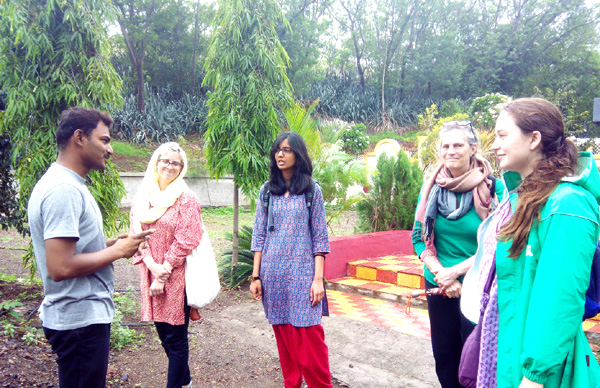 Marathi field trip
Marathi field trip
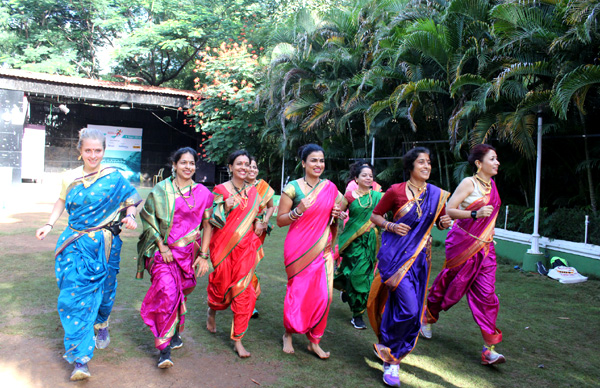 Marathi- Marathan running event
Marathi- Marathan running event
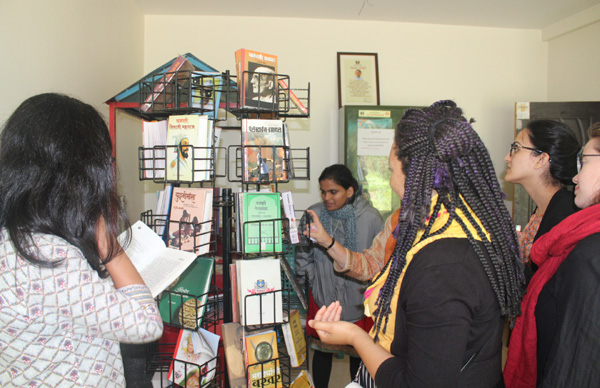 Marathi student at book centre
Marathi student at book centre
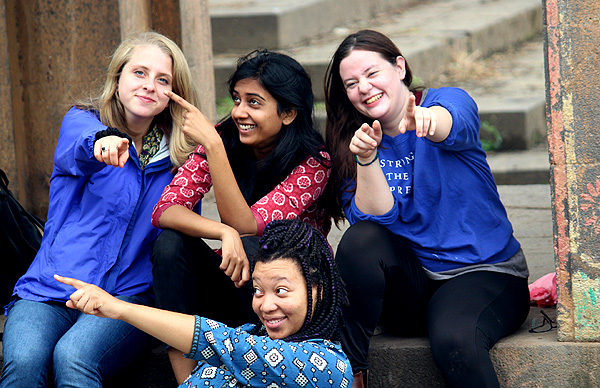 Marathi student enjoying
Marathi student enjoying
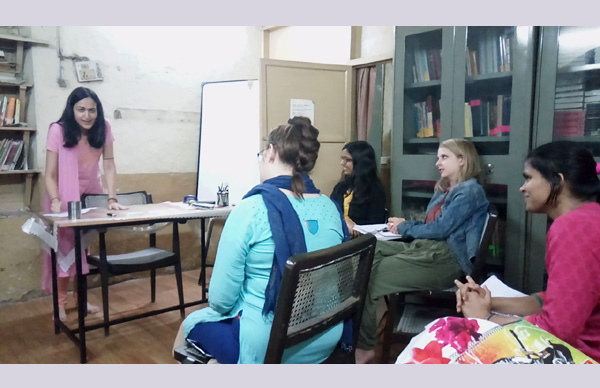 Marathi student in class
Marathi student in class
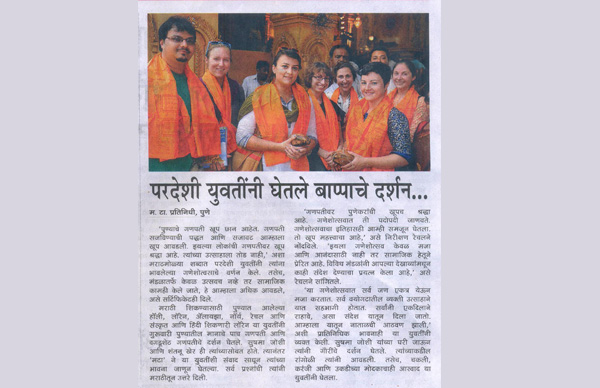 Marathi student in news paper
Marathi student in news paper
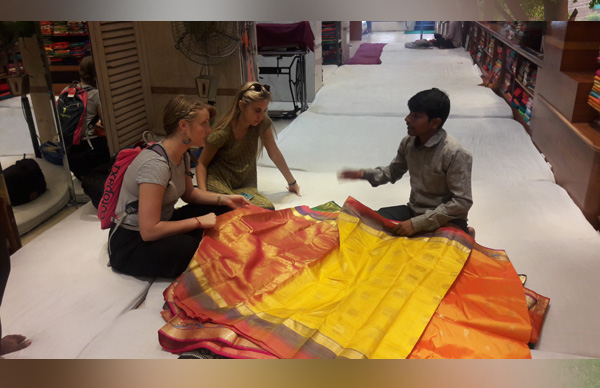 Marathi student purchasing cloths
Marathi student purchasing cloths
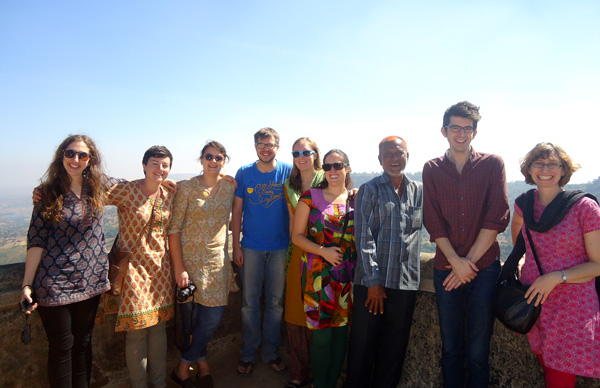 Marathi students at field trip
Marathi students at field trip
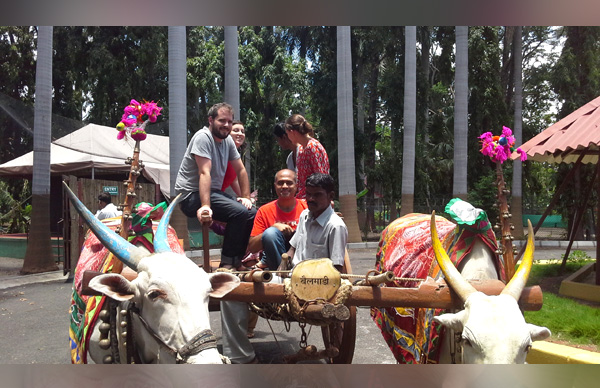 Marathi students enjoying on trip
Marathi students enjoying on trip
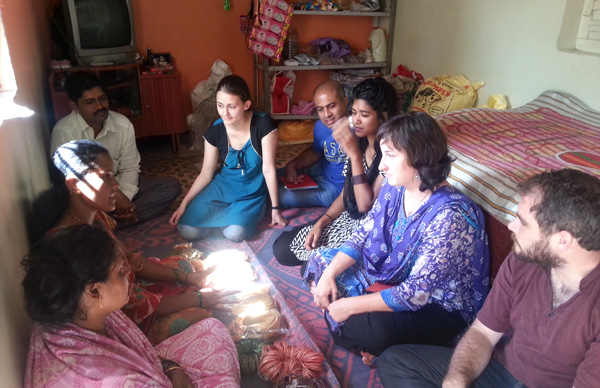 Marathi students with local communities
Marathi students with local communities
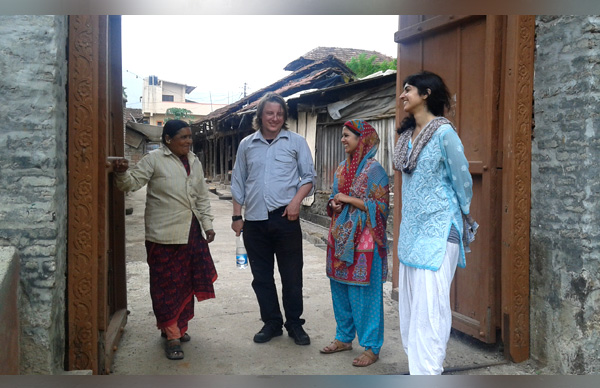 Marathi student on field trip
Marathi student on field trip
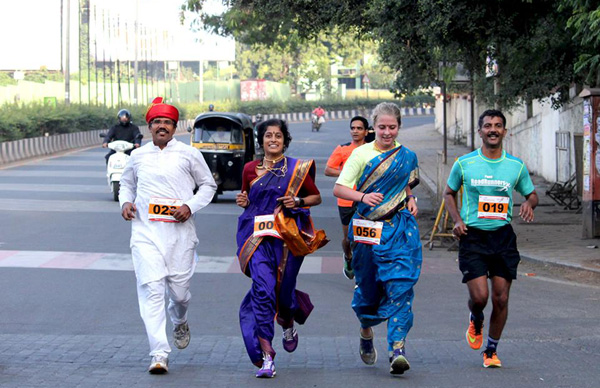 Marathi student participating in Local Marathon
Marathi student participating in Local Marathon
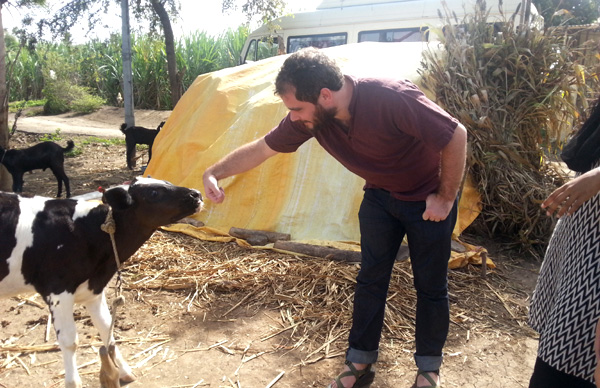 Marathi student playing with cow baby
Marathi student playing with cow baby
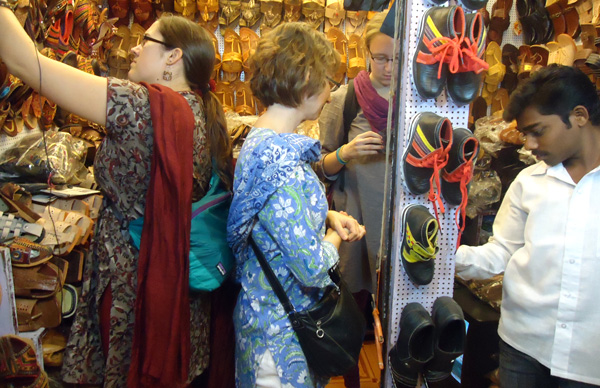 Marathi student purchasing Kolhapuri shoes
Marathi student purchasing Kolhapuri shoes
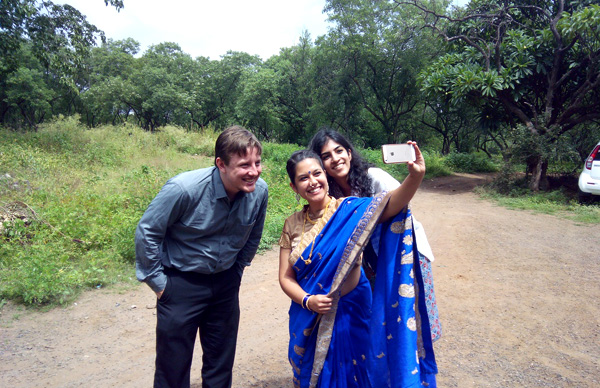 Selfie Marathi Students
Selfie Marathi Students
HOUSING INFORMATION
AIIS assists students in finding local accommodation within a reasonable commuting distance of the Language Program center. Depending on the size of the Program and the availability of suitable accommodations, students are sometimes housed in furnished apartments, but more commonly live in "paying guest" or "home-stay" arrangements in private homes, preferably with families who speak the target language. Detailed guidelines will also be sent to students once they are accepted into an AIIS Program.
American Institute of Indian Studies
Language Program Center → Pune
(FOR SANSKRIT, MARATHI, PRAKRIT, SINDHI AND KONKANI LANGUAGES)
Student's Expenditure Information
| Item | In Rupees | In Dollars, One USD = Rs. 85 |
| Host family rent per month (Including Non AC but with cooler, breakfast , dinner, and meals on holidays | Rs. 25,000 – 30,000/- | 293 - 351$ |
| Apartment Rent per month- (per room - independent bedroom,) living room and kitchen common, (Including sweeping, moping, cleaning the bathrooms, cleaning kitchen utensils ) but it doesn't include breakfast, dinner, and meals | Rs. 30,000- 38,000/- | 351 -445$ |
| Host family rent payment mode | Cash Payment | Cash Payment |
| Laundry Charges Per cloth (simple Washing & Ironing) | Rs. 150/- | 2$ |
| Conveyance to & fro from LP Center (average) (per day) | Rs. 700/- | 8$ |
| Internet Data card (Airtel/Idea) Dongle Rs. 3500/- 41$ | ||
| Internet Plan depending on Download capacity | Rs. 1200 - 1500/- | 14 - 18$ |
| Lunch Rate at AIIS per week (Monday-Friday) * | Rs. 1300/- | 15$ |
| Gym Charges | Rs.1500 – 2500/- | 18-30$ |
| Gym membership fees | Rs. 3000-4000/- | 36 – 47$ |
| International Courier Charges (for 100 gms weight) | Rs.2400/- | 28$ |
| Entertainment (ticket charges at Film Theatre) | Rs.500 - 700/- | 6-8$ |
| Mobile handset including SIM Card (Basic model) | Rs.5000 - 7000/- | 59-82$ |
| Doctor Consultation Fees (if you go to hospital) (if doctor visits your home) | Rs.1000/- to 1600/- | 12- 20$ |
| Music classes like Katthak, singing, harmonium, sitar learning etc (Per hour charges) | Rs.1500/- | 18$ |
Marathi Learning Resources
Dear AIIS SLP Participants at Pune,
Greetings from AIIS-Pune! Below is some important information which, we hope, will help you upon your arrival in Pune.
Pick up: A representative of AIIS Pune will meet you at the Pune airport/Pune Railway station, as per arrival details communicated by you.
Travel from Mumbai to Pune: A good option for getting to Pune from Mumbai International Airport is KK Travels. They operate a limousine shuttle service between drop-off points in Pune and the domestic and international terminals in Mumbai. The agency provides multiple options such as shared cabs, charter cabs etc. The cars run 24/7. Please visit www.kktravels.com to book the car.
Initial Stay and Orientation: Please note the address of the Hotel given below wherein; overnight initial stay (on twin sharing basis) for all participants has been arranged for the one overnight stay upon your arrival, as per institute rules (Check Inn 12:00 Check Out 8.30 a.m.) with Complimentary breakfast arrangement).
PYC Hindu Gymkhana & Sports Foundation
766 Bhandarkar Road, Opp. to Girikand Travels
Next to Good Luck Chowk, Pune - 411 004
Phone No. 020-25664747/020-25664949
Please note that Lunch/Dinner (excluding the day of the stay arranged by AIIS), Laundry, Personal Phone Calls and earlier arrival charges as applicable shall be paid by the student directly to PYC Hindu Gymkhana & Sports Foundation, at the reception. As per the schedule given on the AIIS Website there will be an Orientation at 9.00 a.m. on Tuesday, June 10, 2025 in the A-2 Conference Hall, at the same place. (PYC Hindu Gymkhana & Sports Foundation). After orientation and lunch, students will be moved to apartments / host families. The class activity begins from Wednesday, June 11, 2025. All students, including those who have made their own arrangement of housing at Pune will come to American Institute of Indian Studies, Deccan College Campus, Yerwada, Pune from June 11 till the program concludes.
Things you may require for FRRO registration: Please carry Photo ID in USA [Driving Licence or University Card, Library Card] and your bank account details [in case of need, a statement may be asked for online registration] with you. Each student must have Indian Mobile Phone Number and an Email ID for USER registration and online registration.
Wish you a successful and comfortable stay in Pune.
Best wishes,
Dr. Madhura Godbole
Head, Sanskrit Language Program
Coordinator, AIIS Western Regional Center, Pune
For students interested in taking Modi script classes -
Basic Modi script:
Eligibility - 1 year of formal Marathi training / 1 Marathi Summer Program at AIIS.
Advanced Modi script:
If a student wants to read actual handwritten historic documents in Modi, the student needs to have at least 3 years of formal Marathi training / 2 AIIS Marathi Summer Programs / 1 AIIS Marathi Summer and/or 1 Academic Year or if he/she has learnt Modi with us earlier.
Students should clearly mention in their application that they desire to take the Basic or Advanced course in Modi script. The AIIS faculty is equipped to teach Basic Modi to qualified students. For Advanced Modi, we need to bring in a local expert as an adjunct instructor.
